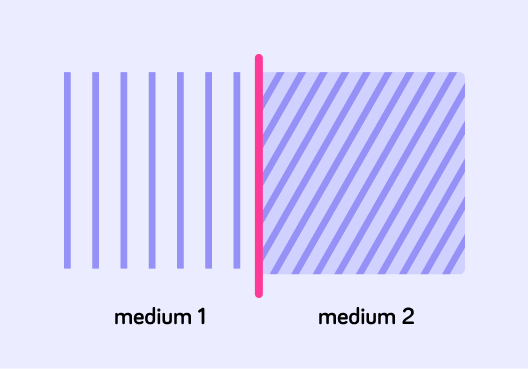YOU ARE LEARNING:
Understanding Refraction

Understanding Refraction
Refraction causes waves to change speed, direction and wavelength, but the frequency does not change.
Imagine you're running along a beach and you decide to run into the water. Does the water increase or decrease your speed?

When a light ray goes from traveling through air to travelling through water, what do you think happens to its speed?

Which medium do you think is denser?

Different media have different densities. Does the speed of a wave depend on the medium it's travelling through? Answer with either yes or no.

When a wave changes in speed when it goes from one medium to another, it is being refracted.
Refraction occurs when a wave travels between media of different densities.

From looking at the diagram, what other feature of the wave is changing because of refraction?
A) Its wavelength. B) Its direction. C) Both its direction and wavelength.


What features of a wave are affected by refraction?

You can select multiple answers
Sound waves are longitudinal waves and require a medium in order to propagate. This is because they transfer energy by vibrating the particles of the medium. In what kind of medium do you think sound waves travel faster? Answer more dense or less dense.

Light waves can travel through a vacuum meaning they don't need particles to propagate. Do you think they travel faster in a less dense medium, like space, or a more dense medium, like water?

In this image we can see an example of light refraction!
The light waves change direction in the denser medium (water).

Refraction causes waves to change speed and direction. The change in wave speed causes a change in wavelength, but the frequency does not change. Light waves slow down when they travel into a denser medium. Sound waves speed up when they travel into a denser medium.
